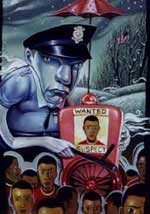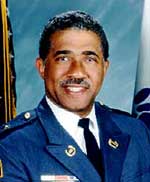Police complete racial profiling training
By Brandt Williams
Minnesota Public Radio
December 17, 2001
|
| RealAudio |
In June, the St. Paul Police Department and the St. Paul NAACP reached an agreement to eliminate racial profiling. The agreement was hailed as groundbreaking because it promised to make officers more accountable to the people they serve. The civil rights organization has finished the last of its training sessions with police officers. Both parties acknowledge there have been challenges. But they are optimistic about the future of the agreement.
| |
|
|
|
||
St. Paul NAACP president Nathaniel Khaliq was part of a four-person team that conducted 18 training sessions.
The team made three-hour presentations to more than 500 police personnel, from top-ranking staff to patrol officers.
Khaliq says he and team members tried to provide officers with a community perspective on racial profiling. But the sessions got off to a rocky start.
"Some of them felt we were racist in our delivery," Khaliq says. "And we were trying to deal with incidents and perceptions and how people's experiences shape their realities."
For instance, Khaliq says officers had a hard time understanding why some people of color fear the police. Khaliq says some of his perceptions of police practices were also challenged.
"We had some good dialogue. We learned some things ourselves - about officers trailing an individual for a long period of time. We believed that officers were doing that to harass and intimidate us. We found out later that sometimes it takes a lot longer to get information on a license plate they may be running," he says.
Khaliq says the atmosphere improved as officers of color spoke up and supported the views of the trainers. Khaliq says it helped that Deputy Chief Dick Gardell began attending some of the sessions.
Gardell oversees officer training. He believes most officers were open to the NAACP's presentation, even though the sessions dealt with sensitive subjects.
"You always have to be careful in those presentations," says Gardell. "There's always going to be hot buttons - topics that could get us off our main goal. And certainly in any of those circumstances, that kind of thing could occur."
Officers were briefed on the new consent search advisory. The advisory informs citizens they have the right to refuse an officer's request to search their person or vehicle.
Officers were also briefed on the new complaint intake procedure, and given business cards to hand out to citizens. The card is printed with the officer's name and voicemail number, as well as a list of agencies where a complaint can be filed, including the internal affairs unit.
| |
|
|
|
||
Gardell says the cards are key to the agreement.
"With the people we met, often times they would say that they didn't know who the officer was who stopped them - that they wanted to make a comment, good or bad," says Khaliq. "Clearly, if the officer did something that you wanted to challenge or if the officer did something that you wanted to say was not appropriate, identifying that officer is the first step."
"I think the fear is that the business card thing just opens more doors - more opportunities for people to complain," says St.Paul police officer Paul Schnell. He acknowledges that some police officers may be reluctant to use the new cards.
Schnell has been a police officer for 11 years and with the St. Paul department for about three. Schnell is also a trainer. He believes officers must see the issue of race from the perspective of people of color.
"The fact that a chunk of our community says there's a problem, there's a problem," says Schnell.
Schnell says, as a white male police officer, he knows his race has influenced his perspective. He says officers are told not to stereotype people based on their race, but racial profiling happens.
"The question is how do we change it. and I think it's going to be tough and that's what's going to be challenging but I think it can happen."
It's too soon to determine what long term effect the NAACP-St.Paul police agreement will have on racial profiling.
However, both Khaliq and Chief Gardell acknowledge an improvement in police-community relations.
Two weeks ago, a black man who struggled to get a gun from the grip of a would-be carjacker was shot and killed by a police officer.
Khaliq says prior to this agreement, the NAACP and police would have butted heads.
"When something like this would happen, we would react to it in a very negative and damning way," says Khaliq. "The department would automatically defend the officer's actions, and we would automatically condemn the officer's actions."
Because of the new relationship, Khaliq says the NAACP will await the results of the police investigation into the shooting before reacting further.
More from MPRMore Information


